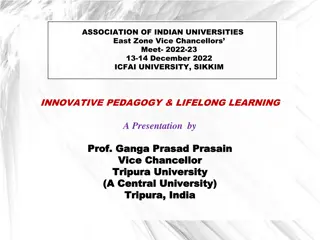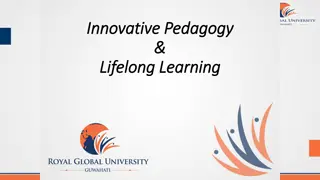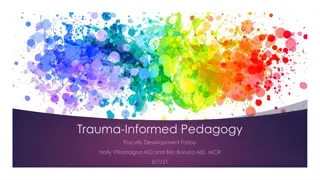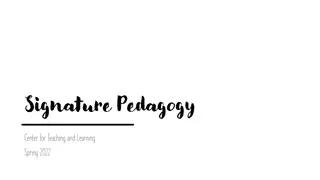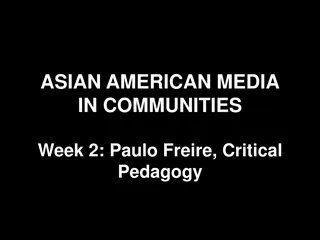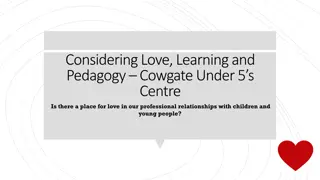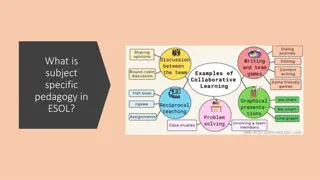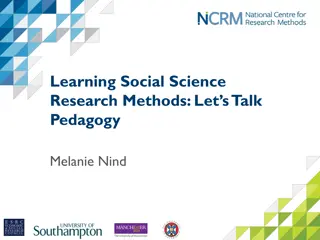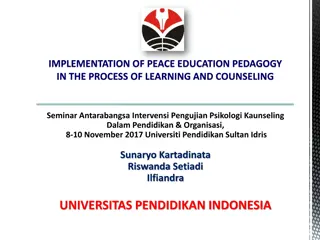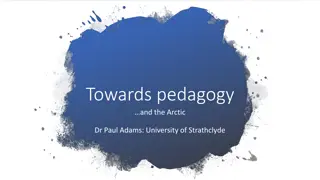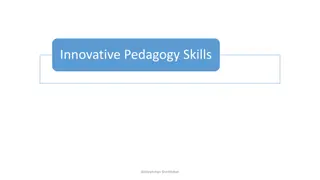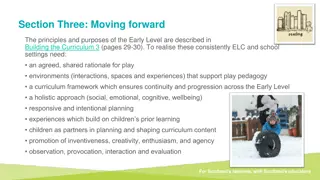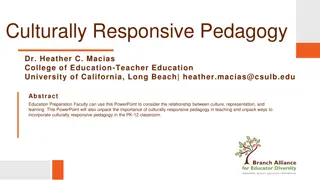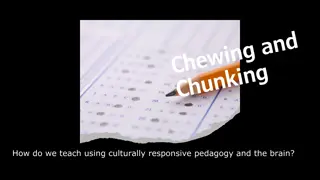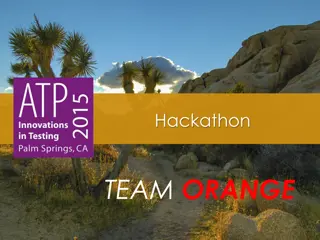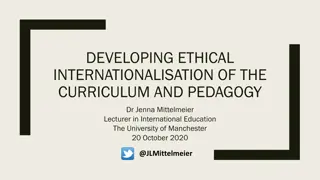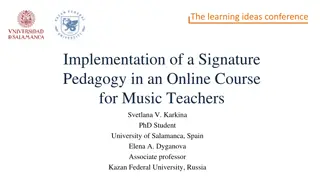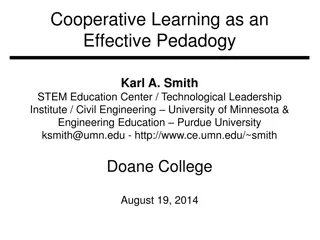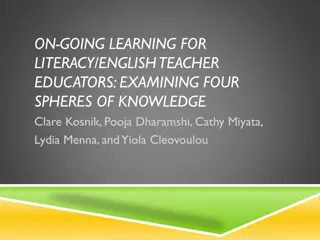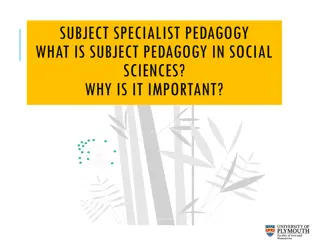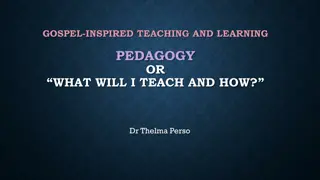Understanding Advanced Pedagogy in Education
Advanced Pedagogy involves skillful planning and implementation of activities to engage learners collaboratively. It emphasizes integrating innovative teaching strategies, technology, and diverse learning modes to enhance student motivation and understanding. The principles of advanced pedagogy focus on creating a supportive and inclusive learning environment that promotes student independence and self-motivation. Embracing advanced pedagogy helps educators adapt to fast-changing educational landscapes and explore new teaching methods for effective learning outcomes.
Download Presentation

Please find below an Image/Link to download the presentation.
The content on the website is provided AS IS for your information and personal use only. It may not be sold, licensed, or shared on other websites without obtaining consent from the author. Download presentation by click this link. If you encounter any issues during the download, it is possible that the publisher has removed the file from their server.
E N D
Presentation Transcript
BED 105 Asst.Prof.Suresh waghmare Dr.D.Y.Patil college of education Pimpri
Introduction to Advanced Pedagogy Meaning of Pedagogy: Pedagogy and pedagogue come from the Greek paidos "boy, child" and ago means lead it means to lead the child Dictionary meaning 1. the art or function of teaching. 2. the art or science of teaching; education; instructional methods.
Definitions of Pedagogy pedagogy: the principles & methods of instruction The function or work of a teacher, teaching. Pedagogy: The art, or science of being teacher, Pedagogy: the activities of educating or instructing. Preparatory training or instructions.
Advanced Pedagogy Advance pedagogy means, a skillful planning of a working system by which achieved conveniently. Advanced pedagogy implementing planned activities to engage the participants as a partner in the teaching activity. In other word, the determination of some policy by planning before presenting the content. For example, CAI, Blended classroom etc. objective can be means developing & learning, Flipped
Advanced pedagogy means teacher can integrate, different innovative teaching strategies, techniques, ICT tools, decision making tools etc into their teaching, design & implement different modes of learning processes through alternative delivery system for courses. Innovative Instructional strategies Advanced pedagogy Use of Adv. technology Enriched Curriculum Effective teaching learning process
Need It strengthens student motivation For promoting discovery/active learning For better understanding. For special as well as all kind learner. For coping with fast changing & volatile environment To scientific study of teaching process. To aware about the various new teaching methods. For self directed learning
Principles of Advanced Pedagogy The learning environment should be supportive & productive. a) build positive relationship by knowing & valuing each student. b) promote a culture of value & respect for individual & their communities. c) use strategies that promote students self confidence & willingness to take risk with their learning. d) ensures each student experiences success through structured support, valuing of efforts of their work. The learning environment promotes independence, interdependence & self motivation. a) Encourages & supports students to take responsibility for their learning.
b) Uses strategies that build skills of productive collaboration. Students need, background, perspectives & interests are reflected in the learning program: a) Use strategies that are flexible & responsive towards needs & interests of individual students. b) Uses a range of strategies that support the different ways of thinking & learning. c) Build on students prior experiences, knowledge & skills . Students are challenged & supported to develop deep levels of thinking & application. a) Plan sequences to promote sustained learning. b) Promotes substantive discussion of ideas c) Use strategies that challenge & support students to question & reflect d) Uses strategies to develop investigating & problem solving skill. e) Uses strategies to foster imagination & creativity.
Assessment practice are an integral part of learning & teaching a) uses assessment practices that encourage reflection & self assessment. b) makes assessment criteria explicit c) uses evidence from assessment to inform planning & teaching. d) Ensure that student receive frequent constructive feedback that supports further learning. Learning connects strongly with communities & practice beyond the classroom. a) Support students to engage with contemporary knowledge & practice. b) plans for students to interact with local & broader communities. c) Uses technologies in ways that reflect professional & community practices.
Learning by discovery Activity learning Learning by doing Individualized Learning Learning by increased communication Learning by increased collaboration Tutor guided learning Situated learning
1. broadest sense. Learning should aim to help individuals and groups to develop the intellectual, personal and social resources that will enable them to participate as active citizens, contribute to economic development and flourish as individuals in a diverse and changing society. This means adopting a broad conception of worthwhile learning outcomes and taking seriously issues of equity and social justice for all. 2. Effective pedagogy engages with valued forms of knowledge. Pedagogy should engage learners with the big ideas, key skills and processes, modes of discourse, ways of thinking and practicing, attitudes and relationships, which are the most valued learning processes and outcomes in particular contexts. They need to understand what constitutes quality, standards and expertise in different settings. Effective pedagogy equips learners for life in its
Effective pedagogy recognizes the importance of prior experience and learning. Pedagogy should take account of what the learner knows already in order for them, and those who support their learning, to plan their next steps. This includes building on prior learning but also taking account of the personal and cultural experiences of different groups of learners. 4. Effective pedagogy requires learning to be scaffold. Teachers, trainers and all those, including peers, who support the learning of others, should provide activities, cultures and structures of intellectual, social and emotional support to help learners to move forward in their learning. When these supports are removed the learning needs to be secure. 5. Effective pedagogy needs assessment to be congruent with learning. Assessment should be designed and implemented with the goal of achieving maximum validity both in terms of learning outcomes and learning processes. It should help to advance learning as well as determine whether learning has occurred.
6. A chief goal of learning should be the promotion of learners independence and autonomy. This involves acquiring a repertoire of learning strategies and practices, developing positive learning dispositions, and having the will and confidence to become agents in their own learning. 7. Effective pedagogy fosters both individual and social processes and outcomes. Learners should be encouraged and helped to build relationships and communication with others for learning purposes, in order to assist the mutual construction of knowledge and enhance the achievements of individuals and groups. Consulting learners about their learning and giving them a voice is both an expectation and a right. 8. Effective pedagogy recognizes the significance of informal learning. Informal learning, such as learning out of school or away from the workplace, should be recognized as at least as significant as formal learning and should therefore be valued and appropriately utilized in formal processes. Effective pedagogy depends on the learning of all those who support the learning of others. The need for lecturers, teachers, trainers and co- workers to learn continuously in order to develop their knowledge and skill, and adapt and develop their roles, especially through practice-based inquiry, should be recognized and supported. Effective pedagogy demands consistent policy frameworks with support for learning as their primary focus. Organizational and system level policies need to recognize the fundamental importance of continual learning - for individual, team, organizational and system success - and be designed to create effective learning environments for all learners. Effective pedagogy promotes the active engagement of the learner. 9. 10.
Teaching phases of Philip Jackson Model Pre active Planning & designing of lesson Inter Active Implementation, Execution of plan, learning experiences Post Active Evaluation & attainment of the objectives
Philip Jackson Model Pre-active phase of Teaching: 1. Determining goals/Set the objective. 2. Selection of the content to be taught 3. Sequencing/Organization of the content 4. Selection of the methods of teaching 5. Select the tool and techniques of Evaluation
Inter Active Phase of teaching This phase includes the execution of the plan where learning experiences are provided to students through suitable modes. Sizing up of the class- make the learner ready to learn, perceive the size of the class, who can help you in teaching, who can create a problem etc. Knowing the learner- knowledge of the learner, abilities, interests, attitudes & academic background of the learner check previous
Operations in the phase Perception Diagnosis Response
Perception: Teacher tries to know himself, his abilities, for teaching against the students also tries to have perception of the abilities, behavior & personality characteristics of the teacher. Diagnosis: A teacher tries to access the achievement level of his students with regards to their abilities, interest & aptitude. He/She questions to know how far students know about the topic. Reaction Process: In this stage teacher observes the students that how they response to the teacher s question. The students has to the proper way of reacting & responding to the various stimuli & teaching techniques presented to it. class group. Similarly can asks several
Teaching Strategies Thinking skill strategies such as De Bono s Six thinking hats & Mind Mapping- White, Red, Black, Yellow, Green, Blue Gardener s Multiple Intelligence Logical- Mathematical, Linguistic, Personal, Bodily Kinesthetic, Naturalist Bloom s Taxonomy: Cognitive & Affective domain Co operative learning-Group Investigations, Jigsaw, Guided reading. Brain Based learning Spatial, Musical,
Post Active Phase of teaching This activities, this can be done in number of ways including tests or quizzes or by observing students reaction of questions, comments, structures & instructed situations. Activities suggested in this phase 1) Defining the exact dimensions of the changes caused by teaching teacher compares the actual behavioral changes in the students with their expected behavioral changes. phase concerns with the evaluation
2) Selecting the proper tool & techniques: teacher selects the techniques to compare the actual behavioral changes in the students with the desired behavioral change which are reliable & valid & which can evaluate the cognitive & non cognitive aspects of the pupil. For Example, i) Draw the Diagram (Observation tool.) ii) Explain the Diagram of plant cell, (Written Exam) testing devices & of plant cell.
3) Changing the strategies in terms of evidences gathered- Based on the responses of the student, change the strategies of teaching. Through evaluation the teaching diagnosed & can be made effective by necessary modifications & changes in them. For example : with the help of chart & PPT activities are
Following are the main operations at this stage 1. Assessing the suitability of objectives determined. 2. Decision regarding re-teaching the content or further taking up the content. 3. Assessing the suitability of the instructional material and aids. 4. Assessing the impact of the classroom environment
Role of Teacher As a planner To develop the accurate plan of teaching. Formation of objectives, it should be in the correct form. Selection of the learning-experiences. For that purpose always select the suitable method. To use the innovative ideas and tricks. To select the Evaluation tool.
Phase II- as good executer Personality of teacher should be good. Good presentation & class control Make a well-planned tests & scales. Refer standard test for testing and measuring student ability & skill. Always use the reinforcement. Phase III- as good evaluator Fix the expected behavior level. Diagnose about the tool & techniques, it's appropriate ? Introspect the fault and enlist the issues. Change the teaching strategy.
Student Voice In education, student voice refers to the values, opinions, beliefs, perspectives, and cultural backgrounds of individual students and groups of students in a school, and to instructional approaches and techniques that are based on student choices, interests, passions, and ambitions. Historically, student councils and other forms of student-led government were the most common channels for students to share their opinions and viewpoints, but many of these opportunities did not allow students to make authentic contributions to the leadership of a school. Increasingly, more school districts now have voting or nonvoting student seats on the school board, and some states even elect student representatives to the state board of education. Students may also be asked to serve on a formal committee, such as a school-improvement committee, or participate in the hiring of a new superintendent, principal, or teacher
Student Voice Meaning : Participation of student in the various activities, program and events conducted by school or teacher. Definition : Student voice is any expression of any learner regarding anything related describes the distinct perspective & actions of young people throughout school focused on education. Active participation of teaching-learning process activities for achieving goal or objective of the education, feedback. to education & the students through, in the Planning
Meaningful means validating & authorizing them to represent their own knowledge & experiences education in order schools. involvement of students ideas, opinions, throughout improve to our
Importance to become active participants Developing decision making skill To build positive relationships with teachers For individual youth development Successful implementation of academic programs To develop leadership skill Student assessment Teacher training
Ways of encourage students voice In writing- Allow for creative expression-Art & Drama, poetry, video etc. Make lessons personally relevant Give more discussion time to explore & develop their ideas Reward risks & recognize those who speak up In gesture, Body language Encourage debate Engage different forms of leadership
Merits Every student get opportunity. All round development. Get direct Experience. Permanent learning & Perfect Learning. Know the capacity and ability of other student. Understand the Opinion, Views and Approaches. It empowers students to take responsibility of their own learning. They become more effective learners. It increases teachers efficiency.
Demerits Without planning it will be time wasting event. Increasing casualness about the study. Over confidence Chances of disrespect of teachers by students. Time consuming
Importance Create new forms of knowledge through its emphasis on breaking down disciplines & creating interdisciplinary knowledge. In removing categories of race, gender, class etc. Reject the distinction between high and popular culture so as to make curriculum knowledge responsive to the everyday constitutes peoples lived histories differently The aim is to liberate students from oppression. knowledge that
Critical Pedagogy Critical Pedagogy follows, Paulo Freire : who is generally considered to be the inaugural philosopher of critical pedagogy. Freire used the term Critical pedagogy himself when describing this philosophy. After Freire Wexler, Mclaren, Ira Shor, Darder worked on this. Critical pedagogy is the means and methods of testing & attempting to change the structures of school that allows inequalities. It is cultural- political tool that takes seriously the notion of human differences particularly those related to race, gender and class.
Critical pedagogy is both a way of thinking about and negotiating through praxis the relationship among classroom teaching, the production of knowledge, institutional structures of the school, and the social and material relations of the wider community, society (Breunig, 2005). Critical pedagogy is a cultural-political tool that takes seriously the notion of human differences, particularly as these differences relate to race, class, and gender. the larger and nation state
Definitions Critical pedagogy refers to the ability to analyze, expose and challenge the hidden social, cultural and political processes that are part of knowledge production including assumptions come from a particular cultural & historical formation. McLaren defines critical pedagogy as follows: Critical pedagogy is a way of thinking about, negotiating, and transforming among classroom teaching, the production of knowledge, the institutional structure of the school, and the social and material relations of the wider community, society, and, nation. how one s views and the relationship
Critical pedagogy may be defined as an approach to encourages students conscious of the social oppressions or dominations around castism, sexism etc) & second to reflect on the actions which may be required to become free from those oppressions or dominations. education first which become to them(racism,
How to be Critically Conscious According to Ira Shor (1992) a student can be critically conscious writing, and speaking while going beneath the surface meaning. A student must go beyond: Myths, clich s, received wisdom, and mere opinions Most importantly students must understand the deep meaning, context, and personal consequences of: Any action, Object, Organization, Subject matter, Mass Media, Text, Policy etc. by: Thinking, reading, root causes, social Process, Experience,
Examples Change in relationship between student & teacher The rejection of Economic determination: race, class, gender, religion.
Role of School & Teacher Role of Schools School responsiveness etc. School should provide sense of democratic community for teachers & students Role of teacher: Curriculum constructer They must be able to critically analyze the ideologies, values & interest. A major function of critical pedagogy is to critique, expose, and challenge the manner in which schools impact upon the political & cultural life of students. Teacher has to motivate & facilitate learners to construct knowledge in a democratic way. should foster public values-accountability,
Merits of Critical Pedagogy It is based on problem based approach which helps in critical analysis. Critical pedagogy transforms the learner from objects to subjects. It makes learner more active. To develop the habit of multi- Dimensional thinking & innovative thinking. It focused on dialogue instead of a one way transmission of knowledge. It creates new forms of knowledge through its emphasis on breaking down disciplinary boundaries. It facilitates collective decision discussion. Students acquire more knowledge than content. Critical pedagogy makes learning a simple and easy. making through open
Demerits of Critical Pedagogy It is not applicable for all type of learners. Possibility of distraction. Some students remain passive. It is not useful for primary level students. Critical pedagogy may not be appropriate for math classes. It is based on the principle that students should come to their own conclusion and there is possibility of wrong conclusion.
Differentiation Differentiated instruction/learning is the process of ensuring that what a student learns, how he /she learns it, how the students demonstrate what he/she has learned is a match for that student s readiness level, interests, mode of learning. Differentiated instruction is an approach to teaching & learning for students with different abilities in the same classroom. & preferred
Differentiation Differentiation is the process by which curriculum objectives, teaching methods, assessment methods, resources & learning activities are planned to cater the needs of the individual learner. Differentiation is teaching strategy which helps us to recognize student varying background knowledge language, preferences in the learning, interests and to react responsively. readiness,
Principles of differentiation Assessment is ongoing & tightly linked to instruction. Teachers ensure respectful activities for all students. Flexible grouping is a hallmark of the class sometimes students work with peers on the same level of readiness & sometimes with different levels of readiness.
Characteristics Assessment is ongoing & diagnostic to understand how to make instruction more responsive to learner need. Focuses on multiple forms of intelligence is event. Students are frequently guided in making interest based learning choices. Multiple materials are provided Students are assessed in multiple ways.
Elements for Classroom differentiation Content: what the students needs to learn or how the students will get access to the information. Process: activities in which the students engages in order to make sense of or master the content. Products: ask the students to rehearse, apply, and extend what he or she has learned in a unit Learning environment: the way the classroom works & feels.
Seven building blocks of differentiated instruction Knowing the learner Traits of a quality teacher Quality curriculum Classroom learning environment Flexible teaching & learning time resources Instructional delivery & best practices Assessment, Evaluation & grading
Engagement in the teaching Student engagement is frequently used to, Depict students Willingness to participate in routine school activities, such as attending class, submitting required work, following teachers directions in class. Student s engagement learning refers to participation in the academic environment resulting in an experience. in student s teaching and active enhanced learning
Definition Learning participation in the academic environment resulting in an experience. Engagement is investment in, active participation in, and emotional commitment to their learning. Engagement is students involvement with activities & conditions high quality learning. refers to students active enhanced learning students cognitive likely to generate


